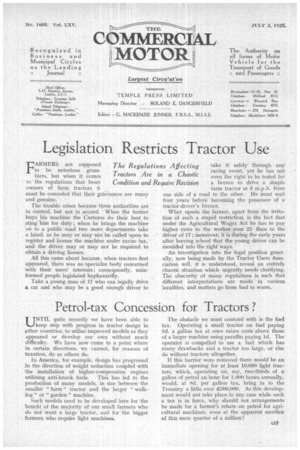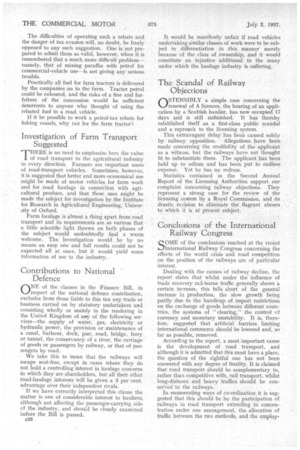Petrol-tax Concession for Tractors ?
Page 63

Page 64

If you've noticed an error in this article please click here to report it so we can fix it.
UT NTIL quite recently we have been able to L./keep step with progress in tractor design in other countries, to utilize improved models as they appeared or develop our own without much difficulty. We have now come to a point where in certain directions, we cannot, for reasons of taxation, do as others do.
In America, for example, design has progressed Jn the direction of weight reduction coupled with the installation of higher-compression engines utilizing anti-knock fuels. This has led to the production of many models, in size between the smaller " farm " tractor and the larger " walking " or " garden " machine.
Such models need to be developed here for the benefit of the majority of our small farmers who do not want a large tractor, and for the bigger farmers who require light machines. The obstacle we must contend with is the fuel tax. Operating a small tractor on fuel paying 8d. a gallon tax at once raises costs above those of a larger machine using paraffin paying 1d. The operator is compelled to use a fuel which has many drawbacks and a tractor too large, or else do without tractors altogether.
If this barrier were removed there would be an immediate opening for at least 10,000 light tractors, which, operating on, say, two-thirds of a gallon of petrol an hour for 1,000 hours.annually, would, at 8d. per gallon tax, bring in to the Treasury a little over £200,000. As this development would not take place in any case while such a tax is in force, why should not arrangements be made for a farmer's rebate on petrol for agricultural machines, even at the apparent sacrifice of this mere quarter of a million? The difficulties of operating such a rebate and the danger of tax evasion will, no doubt, be freely opposed to any such suggestion. One is not prepared to admit them as valid, however, when it is remembered that a much more difficult problem— namely, that of mixing paraffin with petrol for commercial-vehicle use--is not giving any serious trouble.
Practically all fuel for farm tractors is delivered by the companies on to the farm. Tractor petrol could be coloured, and the risks of a fine and forfeiture of the concession would be sufficient deterrents to anyone who thought of using the rebated fuel in a road vehicle.
If it be possible to work a petrol-tax rebate for fishing vessels, why not for the farm tractor?




















































































































































